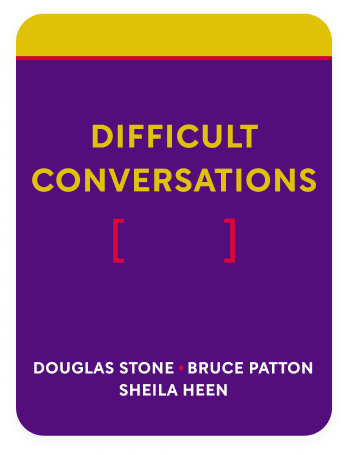

This article is an excerpt from the Shortform book guide to "Difficult Conversations" by Douglas Stone, Bruce Patton, Sheila Heen. Shortform has the world's best summaries and analyses of books you should be reading.
Like this article? Sign up for a free trial here .
Are you looking for a difficult conversation preparation worksheet? What are some things you should ask yourself before you head into a difficult conversation?
Difficult conversations are so difficult first and foremost because of how we approach them. Most of us treat them like we treat swimming—we close our eyes and just jump in, but this is hardly the best way to go about it. The following difficult conversation preparation worksheet will help you work through the issue before you take the plunge.
You can come back to this difficult conversation preparation worksheet anytime you find yourself approaching a challenging conversation.
Preparation Worksheet for a Difficult Conversation
In business, in day-to-day interactions, and in personal matters, difficult conversations come up all the time—conversations where people’s thoughts, feelings, and perceptions about certain issues are in conflict. This difficult conversation preparation worksheet will help you handle your next difficult conversation more productively.
Exercise 1: Acknowledging Contributions
Pick a current issue you have with someone in your life, such as a partner, a friend, your boss, or a colleague. Briefly summarize the issue from your own perspective.
List out 3-5 ways that you feel the other person is contributing to the issue.
Now, list the same number of ways that you might be contributing to the issue.
Exercise 2: Separating Intention From Impact
Think of an issue you had with someone else in the past, or one you’re currently experiencing. First, write down the actions the other person took. What did they actually say or do that led to the issue?
Now that you’ve written out their actions, turn inward. What was the impact of their actions? How did their actions make you feel?
How did the impact affect your assumptions? We often jump to conclusions in these situations — “he hurt my feelings, so he must not care about me” — and make assumptions based on how things affect us. What assumptions did you make in response to the impact?
Exercise 3: Third-Person Perspective
We often only focus on our own perspective in a difficult conversation, when the more productive way to go into them is from a third-person perspective.
Think of an issue you’re having currently or have had in the past. Summarize the issue from a third-person perspective.
Next, list the ways that you have contributed to this issue, then list the ways that you feel the other person has contributed.
Difficult conversations bring up feelings that we may or may not be comfortable with. What feelings has this issue brought up for you? Try to write down the obvious feelings and also the less obvious feelings that may be lurking beneath the surface.

———End of Preview———
Like what you just read? Read the rest of the world's best book summary and analysis of Douglas Stone, Bruce Patton, Sheila Heen's "Difficult Conversations" at Shortform .
Here's what you'll find in our full Difficult Conversations summary :
- Why healthy relationships need difficult conversations
- The 3 conversations that happen within each difficult conversation
- How difficult conversations go wrong and what to do about it






